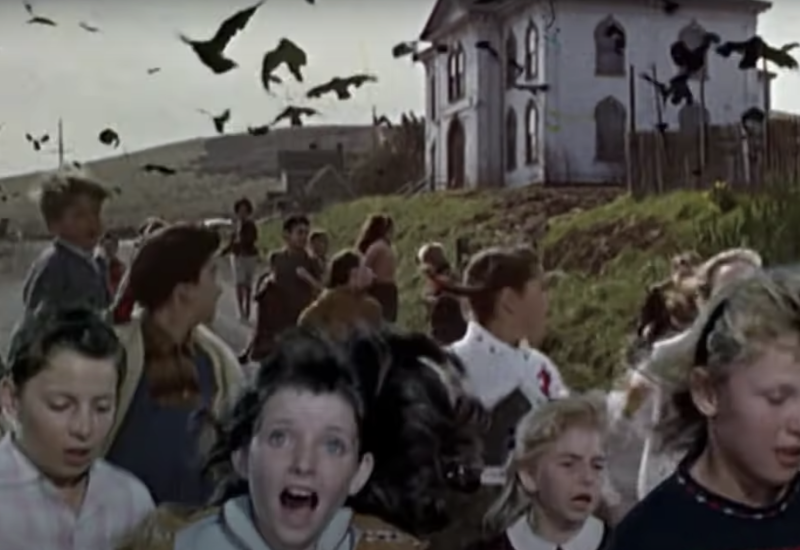Given that The Birds has no musical score and is soundtracked almost entirely by the sound of screeching birds, the children’s song carries a particular sense of foreboding. Their repetitive little ditty has creeped me out since I was a child myself, and it continues to do so. In part, because it sounds like a song that is intrinsically designed to drive you mad if you listen to it for long enough.
So where the hell did this thing come from?
It’s called “Risselty Rosselty” and the version that we hear in The Birds goes a little something like this:
I married my wife in the month of June,
Risselty rosselty, now, now, now,
I brought her home by the light of the moon,
Risselty rosselty, hey Johnny Dosselty,
Nickety nackety, rustical quality,
Willickey wallackey now, now, now.
In subsequent verses, while the more nonsensical lines remain roughly the same, the first and third lines often change to push the song’s narrative along.
In the second verse, we find out that the wife “combed her hair but once a year,” and that “with every stroke, she shed a tear.” In the fifth we hear that she “swept up the floor but once a year,” and “said that brooms were much too dear.” In the seventh, the wife churns “butter in her dad’s old boot,” and “for a catch, she used her foot.” In the seventh, things get even grosser: “The butter, it came out a grisly grey,” and “the cheese, it took legs and ran away.” In the ninth, her husband finally tries to put his foot down and fails. “I asked my wife to wash the floor,” this verse goes, “she gave me my hat and she showed me the door.”
The version of “Risselty Rosselty” that we hear in The Birds is actually a sanitized rendition of a 19th century Scottish folk song called “Wee Cooper O’Fife,” in which a wife is failing to perform her household duties.
Sample verse:
She wadna wash, nor she wadna wring,
Nickety, Nackety, noo, noo, noo,
For the spoiling o’ her gowden ring,
Hey Willy Wallacky, hoo John Dougal,
A lane, quo’Rushity, roue, roue, roue.
In this original, wee Cooper (the husband), frustrated by his wife’s vanity and laziness, takes to physically abusing her to teach her a lesson.
Yeah.
At one point he lays “sheep’s skin” on her back before beating her.
The Cooper has gane to his woo’ pack,
Nickety, Nackety, noo, noo, noo,
And he’s laid a sheep’s skin on his wife’s back,
Hey Willy Wallacky, hoo John Dougal,
A lane, quo’Rushity, roue, roue, roue.
It’s I’ll no thrash ye for your gentle kin,
Nickety, Nackety, noo, noo, noo,
But I will thrash my ain sheep’s skin,
Hey Willy Wallacky, hoo John Dougal,
A lane, quo’Rushity, roue, roue, roue.
(No wonder The Birds didn’t go with the original.)
“Wee Cooper O’ Fife,” it turns out, originally arrived in the United States sometime at the turn of the 19th century, and was later recorded by a variety of American folk artists including Burl Ives and Glenn Yarbrough. The version we hear in The Birds, however, is more closely based on a rendition by Pete Seeger from 1957 that erased all of that uncomfortable domestic violence stuff.
(Seeger’s sister Peggy also recorded a version.)


